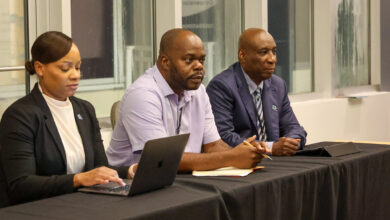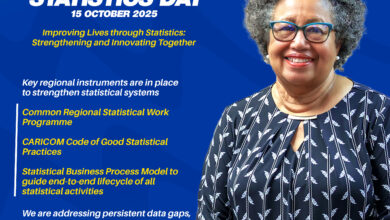Dear Colleagues,
If there is anyone in our midst who is of the belief that when we met in September 2004 at our First Stakeholders’ Meeting, that that meeting took place in a backdrop of uncertainty, today as we meet at this Second Stakeholders’ Meeting, the circumstances are even more ominous.
The dark cloud hovers over us as a result of the recent ruling by the WTO Appellate Body on the EU sugar case has not made the situation less worry-some.
What is mind-boggling about this unfolding drama is the hollow ring that reverberates from all the talk about commitment to the Millennium Development Goals by the European Commission who at the same time, appears to be hell-bent in pushing through proposals to reform the EU’s Sugar Regime which we have said ad nauseam, will certainly undermine whatever success we achieve vis-a-vis the Millennium Development Goals. Moreover, we have to ask ourselves, what has happened with Mandelson’s promise that; “The EU’s assistance package must come into play as early as possible so as to anticipate rather simply cushion changes”.
Since then we have heard that we will be offered ‘thirty pieces of silver’ to help us adjust in accordance with the much vaunted “Action Plan”.
But what about the socio-economic and psychological implications of this adjustment? Can this be really costed in dollars or Euros?
From all indications, the Commission appears to be in a rush to have us consider this plan urgently. But at the same time, we are ignored with respect to our own demands for a fair and equitable deal including a much less severe reduction in price, starting 2008 instead of 2006 and introduced over an eight-year period rather than a three-year period.
This is our alternative which we put to the Commission and which apparently has fell on deaf ears. And what about our demand for the establishment of a “Competitiveness Fund”. Here again we have been totally ignored by our European counterparts.
Moreover, our request for funding to be provided for fifteen sugar research projects in the context of Intra-ACP Cooperation have been shelved by the EC in preference for a “forward looking adaptation strategy” whatever that means.
I believe the time has come to end the shadow boxing with the Commission. We must now engage frontally with the Trade, Development and Agriculture Commissioners. And we need to engage live and direct with them since they themselves have expressed a desire to discuss these matters with us.
Further, we must hold Mandelson to his promise when he said here in Guyana that: “I am not going to fall down on my responsibility. I give you my word that I, as EU Trade Commissioner, the Development Commissioner and my colleague the Agriculture Commissioner, the whole Commission will be with you”.
Colleagues, we have come a far way since our First Meeting of Stakeholders. Many of the decisions we adopted at that meeting, have either been implemented or still be vigorously pursued at various levels.
We have engaged in a successful lobbying exercise culminating with a historic Joint Declaration with the Spanish Authorities on the Reform of the Common Market Organization (CMO) for Sugar.
We now have a number of key EU Member States on our side. This “Blocking Minority” alliance with the ACP needs to be consolidated further in light of the recent ruling by the WTO Appellate Body. Moreover, our efforts at mobilising the Caribbean Diaspora has met with some success albeit limited. We need to press further on this front.
And while there appears to be a better understanding of our position by key and influential international NGO’s, more work needs to be done on this particular front. We need to keep the dialogue going with them with a view to eventually bringing them around to our positions.
Colleagues, with the assumption of the UK to the Presidency of the EU and the G-8, we need to strategise on ways and means of encouraging the UK to give a strong steer those G-8 members at the WTO and the Commission with the objective of encouraging them to adopt pro-development positions which can ultimately address our development deficits.
Colleagues, I am sure you will agree with me when I say that in this on-going struggle no Quarter must be given. The struggle for our survival must be waged on all fronts.
At this time, like good strategists we must have our plan “B” and our plan “C” to confront the challenges that could emerge from the EC’s using the findings at the WTO Appellate Body to justify a direct attack on the CMO on Sugar and the acquisition of the Sugar Protocol.
Such fall back positions should also be applicable to the EC’s approach to the impending review of the Sugar Protocol in the context of the current EPA negotiations.
I have no doubt that we have eminent thinkers and strategists in our midst who have already applied their talents to such complex matters.
In conclusion, let me take this opportunity to record my deepest gratitude to all Stakeholders who, in various ways, have contributed to the advancement of our Region’s interest where sugar continues to be the flavour of the day. Our deepest gratitude is also extended to our High Commissioners in London and our Ambassadors in the Brussels.
In the circumstances, I would like to single out for special mention Dr. Ian McDonald whose fifty years with sugar is currently being honoured. We are all indebted to this indefatigable fighter for Sugar and for the yeoman service he has given to our Region and its people.
Thank you.





